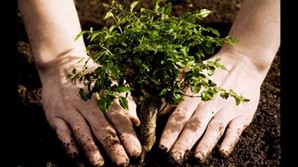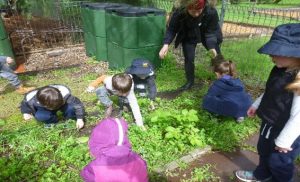Sr Margaret Atkins, Boarbank Hall.
Around fifty people were involved in a recent Zoom weekend from Boarbank Hall on the theme Living Laudato Si’: Your Planet and Your Parish. It aimed to inspire, inform, connect and encourage anyone wanting to engage in practical and prayerful projects in response to the encyclical, especially through parish groups and activities. After  all, the Church, with its combination of local and global networks, is the perfect structure for helping to reshape the world in its current state of crisis. We need small parish groups to be the leaven in the lump of the Church, and the Church to be the leaven in the lump of the world.
all, the Church, with its combination of local and global networks, is the perfect structure for helping to reshape the world in its current state of crisis. We need small parish groups to be the leaven in the lump of the Church, and the Church to be the leaven in the lump of the world.
The original plan had been to have a residential weekend at Boarbank. Switching to Zoom, for obvious reasons, enabled us to reach far more people, and led to a very lively set of conversations, and in particular the pooling of questions, information, ideas and experience. We are still busy collating the fruits of these to share with the group, and more widely.
The long weekend began and ended with encouragement from two bishops who have led from the front in their own dioceses and more widely. Bishop Richard Moth set a prayerful tone with his reflection on the importance of taking time to attend and discern. Bishop John Arnold concluded by encouraging us to respond to both Laudato Si’ and Fratelli Tutti with faith and hope.
On Saturday we had three talks, well spaced to allow people to escape from their screens in between! Trish Sandbach, who worked for many years for OXFAM and is now an assessor for the LiveSimply award (Ed:as well as being Vice-chair of the J&P Commission), talked us through the process of leading her own parish to the award, and added some theological reflection inspired also by the encyclical. John Paul de Quay, founder of the Ecological Conversion Group and the Journey to 2030 website, both supported by the Bishops’ Conference, spoke about ecological conversion, and answered with humour imagined objections that he has frequently encountered. Sr Margaret Atkins spoke about the way in which the power of technology can shape our mindsets, distancing us from reality and generating both pride and thoughtlessness.
Sunday afternoon and evening were dedicated to questions to our panellists, who covered a range of topics: wildlife gardening, organic gardening, tree planting and compost; energy saving and installing electric points; disinvestment and reinvestment; reducing waste; connecting with the younger generation, and listening to the cry of the poor. The very informative and lively questions and answers were supplemented by an equally active contribution on the chat from the participants.
very informative and lively questions and answers were supplemented by an equally active contribution on the chat from the participants.
On the final evening, we made space for general discussion, with a focus on how to take the work of the weekend forward, in particular by benefiting from contacts with each other: various possibilities for online groups and contacts are now in process. The resources shared over the weekend by participants will also be made available in a user-friendly form, especially through the Journey to 2030 website. About – The Journey to 2030
Two other features made the weekend more than an online conference. We shared online Night Prayer, and one Morning Prayer, beautifully presented by Karen Groves and John Moffat, our online hosts. We also offered participants a screen-free activity each day, to enable them to pray, reflect and act on themes relevant to the whole weekend.
We found that there was certainly enough interest to repeat the weekend, probably more than once. If you are interested or know anyone who might be, please contact Sr Margaret on margaret@boarbankhall.org.uk, or just keep an eye on the Journey to 2030 or Boarbank Hall (www.boarbankhall.org.uk) websites. The more we can do to encourage, inform and support each other, the more hope and joy there will be in a dark and threatened world.
And one final task for you. Where are all the millions of trees we need to plant in this country going to come from? Well, how about you?
This year is a great one for acorns. Oaks have long tap roots, so the best plant pots for them are upcycled plastic drinks bottles! Simply cut the top off, and make a drainage hole or two in the bottom and plant the acorn. In a few years’ time, you will have to find a good place to plant it, perhaps with the help of your Church or a local community group.
 Best of all, find some young people to do this with – your children or your grandchildren. They will be around to see the miracle of this little acorn growing into a majestic tree. So will their children and grandchildren….
Best of all, find some young people to do this with – your children or your grandchildren. They will be around to see the miracle of this little acorn growing into a majestic tree. So will their children and grandchildren….
Saving waste, reducing carbon, helping biodiversity, creating beauty, great exercise, and really good fun. What better way of growing hope this autumn? Not so much ‘Pay as you Go’, rather ‘Pray as you Grow!’
For more information on the Live Simply Award please see CAFOD’s website on Livesimply award | CAFOD and listen to our Vice Chair Trish Sandbach in this LiveSimply video https://youtu.be/PKZ4k8DhckI

